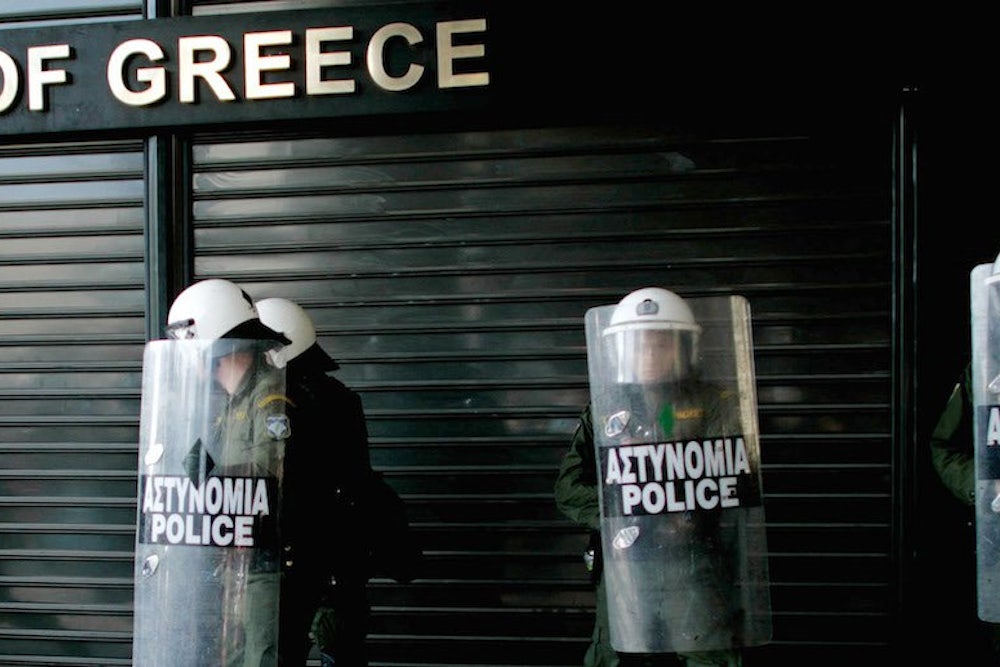The emphatic rejection of disastrous austerity policies by the newly-elected Greek government has caused consternation in eurozone capitals. Germany has been particularly strong in dismissing Greek pleas for a renegotiation of its debt and has warned of an impending fallout should Greece persist in its demands.
But rejecting Greek proposals for restructuring its unpayable debt out of hand would be a mistake. It would have costly consequences for Europe and perhaps the world, while causing mayhem in Greece. Not only could this spell the beginning of the end of the common currency, but it would put in question the whole project of a unified Europe.
Indeed, the handling of what is largely a self-inflicted eurozone crisis has already dealt a severe blow. Rather than allowing irresponsible bond-holders (largely German and French banks) to assume responsibility for their poor lending practices, a savage combination of drastic cuts in public spending and steep increases in taxation was imposed on the entire eurozone population.
Europe divided
The immense social cost of the austerity policies demanded by the surplus-generating Germany from less competitive economies of the South has put in question the political and social objectives of an “ever closer union” proclaimed in the Treaty of Rome, a founding EU document. Unemployment is at a record high in Greece and Spain, particularly among youth, where it reaches 50 percent.
Worse perhaps is the use of divisive language about lazy, undeserving Southerners and hard-working, virtuous Northerners to enforce these brutal measures. Due to the high level of debt, the pre-existing structural weaknesses, and dysfunctional governance, the Greek economy was affected the most. The majority of the population experienced a sharp decline in living standards, the middle class was often reduced to abject poverty, and the most vulnerable faced a humanitarian crisis.
At the same time, German exports benefited from the weakened Euro, and servicing the country’s debt is now much cheaper due to the very low interest rate of German bonds. But German citizens who are made to believe that they bear the cost of other people’s mistakes are largely unaware of how their economy has benefited. Although the taxation level on workers and pensioners increased dramatically, this did not stop xenophobic and often racist narratives that say the Greeks inflicted damage on themselves and must pay for it. Such an approach is both counterproductive and hurtful to those who suffer while struggling to repay.
A clean break
The Greek debt has spiralled out of control because of the erroneous policies decided and implemented by their creditors. And while Greek and EU citizens were pressured into assuming collective responsibility for lenders’ risky investments, the bailout money was given to the same corrupt elites in Greece with whom the EU had previously collaborated. Their management of the crisis has been abysmal: The same parties implemented the most brutal austerity program, hitting the poorest and most vulnerable sections of society hard, while failing to implement much needed reforms.
Well aware of the shortcomings of their official institutions, Greeks have now brought Syriza to power. Their priority is to address the corrupt practices of handing public works contracts to party cronies, reform badly structured banks that routinely draw on state resources, and deal with the country’s mass media owners who have long been accused of tax evasion.
Syriza could mean a clean break with these practices of old and should be given a chance to come through on its pledges. Most analysts and economists agree that the debt, reaching 175 percent of GDP in 2013, cannot be realistically repaid in its entirety. At the very minimum, the country should be given an opportunity to restart its economy, with a view to repaying the debt in the longer run.
Rebuilding solidarity
To revive its economy, Greece must rebuild a fractured society, which involves first restoring its dignity. Syriza’s refusal to allow the unelected troika of creditors (the European Commission, European Central Bank, and International Monetary Fund) to effectively run the country is not based on an unwillingness to work with its lenders. It represents an attempt to shore up confidence and instill hope in a Greek society that finds itself at a breaking point.
The debt crisis has brought to the fore the difficulties of eurozone governance, putting to test the solidarity of EU member states upon which the union was founded. Members are rightly concerned about the absence of mechanisms to effectively distribute the costs and risks of the monetary union between the Eurozone countries. But short-termism and acting to protect narrowly defined national self-interests also threaten the European project.
There is a lot at stake in the ongoing negotiations between the Greek government and its creditors. The reasons for establishing the European Community in 1957 was to ensure a long lasting peace and prosperity for its people. This goal is more relevant than ever if the European Union is to survive and thrive.
![]()
This article was originally published on The Conversation. Read the original article.
